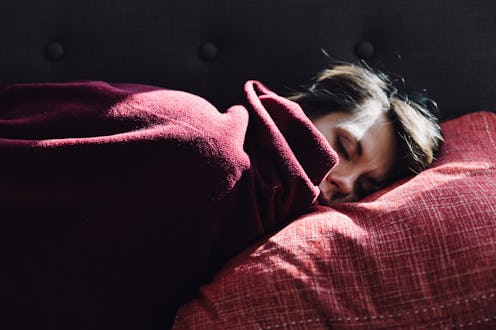Wellness
Experts Explain What The Apple Watch’s New Sleep Tracking Features Can Do For Your Zzz’s

Anybody who downloads the new watchOS 7 to their Apple Watch when it's available in the fall will have the chance to work on their ZZZs. The new operating system comes with a series of elements designed to improve sleep quality, including a sleep-tracking system, nightly meditations and soothing music, and apps that establish regular bedtime routines.
The sleep features have a variety of components. Wind Down slows down the watch's activity before your bedtime and lets users create their own bedtime ritual on the Watch, which could include podcasts, soothing images, or meditations. Sleep Mode means the watch automatically dims at a pre-set time and won't disturb you throughout the night. Its monitoring system tracks and analyzes your nightly patterns as you snooze. The Health app on your iPhone collects that data, including your heart rate, and compares it for consistency over time. In the morning, the watch can give you small haptic touches — little buzzes on your skin — or gentle sounds to wake you up. While the system won't be available until the fall, it's already being buzzed about after its reveal at WWDC.
Experts say this emphasis on a nightly routine is valuable for healthy rest. "Each of us is equipped with an internal 24-hour body clock known as our circadian rhythm which tells us when to rest and when to be alert, and it craves consistency," Bill Fish, head of the Sleep Foundation and certified sleep science coach, tells Bustle. The body responds most positively to patterns of sleeping and waking that remain constant over time, which is why catching up on sleep over the weekend actually isn't great for satisfying snoozing.
Apple Watch's Wind Down feature also draws on science about how we get ready for bed. "Having a nice relaxing bedtime routine puts the brain and body into the correct place for good sleep," Neil Stanley Ph.D., a sleep researcher, tells Bustle. "Unfortunately, most people’s bedtime routine is to switch a gadget off, have a pee, and brush their teeth and then flop into bed, expecting sleep to magically happen, and being quite surprised when it doesn’t." In that light, the Apple Watch's emphasis on meditation and winding down might be helpful.
Stanley welcomes the introduction of meditation apps like Calm into nighttime routines. "In order to get good sleep, you need to quieten the mind," he says. Research published in JAMA Internal Medicine in 2015 found that mindfulness meditation in particular could help insomnia and improve feelings of restfulness. "But remember the old adage: one man’s relaxation is another man’s torture. You need to find what works for you and what you enjoy doing."
Still, relying on a screen to help you get good sleep is a bit counterproductive, experts say. "We actually recommend removing all screens from your bedroom and charging your phone in another room," Fish says. "The mind needs time to wind down to begin the ritual of sleep, so it is recommended to discontinue the use of screens within 45 minutes of bed time." A study published in Current Biology in 2019 shows that light of many kinds, including yellow light and the blue light that emanates from electronic devices, can disrupt our sleep-wake cycles. Even with the Apple Watch's dimmed screen, people who stare at it right up to their bedtime might find it harder to rest peacefully.
Constantly monitoring your rest can also be counterintuitively harmful. "I sometimes feel that users may rely a bit too heavily on technology when thinking about their sleep," Fish says. Stanley says that rest-monitoring apps can have a downside, in that they can make people worry about their snoozing performance every night, leading to tossing and turning. Some researchers have called this orthosomnia. "Apps tell you nothing more than what you actually know yourself: if you feel you are awake, alert, and focused during the day, you have had enough sleep," he says. "If you feel sleepy during the day, you haven’t."
While it's great that people are aware of their nightly rest as a key component of their health, Fish says, all apps have their limits. "There is no question that the technology continues to improve, but in reality, how you feel is the most important factor as to the effectiveness of your sleep," he says.
Experts:
Bill Fish, Certified Sleep Science Coach
Neil Stanley Ph.D.
Studies cited:
Black, D.S., O’Reilly, G.A., Olmstead, R., Breen, E.C., Irwin, M.R. (2015) Mindfulness Meditation and Improvement in Sleep Quality and Daytime Impairment Among Older Adults With Sleep Disturbances: A Randomized Clinical Trial. JAMA Intern Med. 175(4), 494–501. doi:10.1001/jamainternmed.2014.8081
Mouland, J. W., Martial, F., Watson, A., Lucas, R. J., & Brown, T. M. (2019). Cones Support Alignment to an Inconsistent World by Suppressing Mouse Circadian Responses to the Blue Colors Associated with Twilight. Current Biology, 29(24). doi: 10.1016/j.cub.2019.10.028